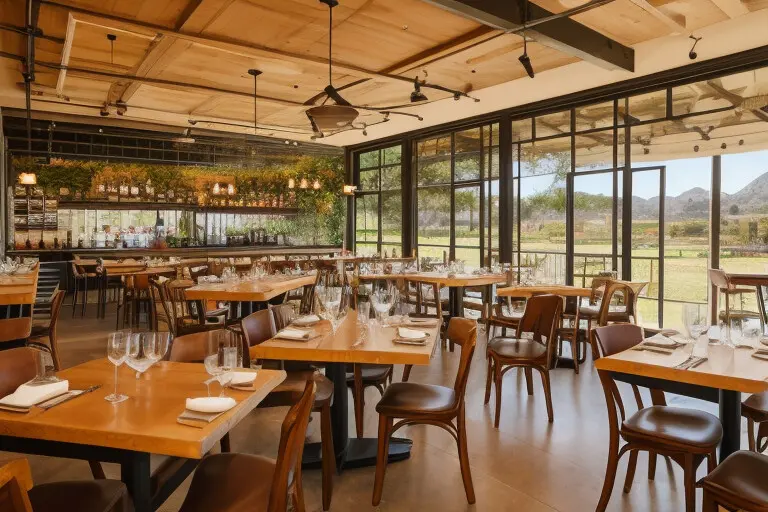Introduction to California’s Farm-to-Table Movement
As a food enthusiast and advocate for healthy eating, I have always been passionate about discovering new restaurants and culinary experiences. Recently, I have become particularly invested in the farm-to-table movement in California. This trend, which emphasizes locally-sourced ingredients and sustainable dining practices, has transformed the way many people think about food and agriculture in the Golden State.
The farm-to-table movement started gaining traction in California several decades ago, fueled by a growing interest in organic and locally-grown produce, as well as a desire for a more sustainable approach to food production and consumption. At its core, the movement seeks to connect consumers with the origins of their food, fostering a greater appreciation for the hard work and dedication that goes into producing high-quality, fresh ingredients.
Today, California is home to a thriving farm-to-table scene, with numerous restaurants committed to serving delicious, locally-sourced cuisine. From the lush valleys of Northern California to the sun-kissed coastlines of the south, these eateries are passionate about showcasing the best of the state’s agricultural bounty.

The Importance of Locally-Sourced and Sustainable Dining
Choosing to dine at a farm-to-table restaurant is about more than just enjoying a delicious meal. It’s about supporting a sustainable, ethical approach to food production that benefits both people and the planet. When you opt for locally-sourced ingredients, you help reduce the environmental impact of your meal by cutting down on the transportation needed to bring food to your plate.
Sustainable dining also supports local farmers and economies, ensuring that small-scale, family-run farms can continue to thrive in the face of growing competition from large-scale, industrial agriculture. By patronizing farm-to-table eateries, you’re investing in a more equitable and resilient food system that values environmental stewardship, fair labor practices, and community engagement.
Finally, choosing locally-sourced cuisine can also benefit your health. Fresh, seasonal ingredients are often more nutrient-dense than their mass-produced counterparts, which can spend days or even weeks in transit before reaching your plate. Plus, farm-to-table restaurants often prioritize organic and pesticide-free produce, meaning you can enjoy a cleaner, more natural dining experience.
Exploring the Farm-to-Fork Concept
The farm-to-fork concept is a key component of the farm-to-table movement. It emphasizes the importance of sourcing ingredients directly from local farms and producers, thereby minimizing the distance between the field and the plate. This approach not only ensures that you’re enjoying the freshest, most flavorful ingredients possible, but it also fosters a greater sense of connection between diners and the land that sustains them.
Many farm-to-table restaurants take the farm-to-fork ethos one step further by cultivating their own on-site gardens or partnering with nearby farms to secure a steady supply of seasonal ingredients. This close relationship between chefs and farmers allows for greater creativity and flexibility in menu design, resulting in dishes that truly celebrate the flavors of the region.
In addition to sourcing ingredients locally, farm-to-fork establishments often prioritize sustainability in other aspects of their operations, such as energy use, waste management, and staff training. By embracing a holistic approach to sustainability, these restaurants are helping to redefine what it means to be a responsible, environmentally-conscious business in the 21st century.
The Benefits of Seasonal Ingredients and Farm-Fresh Produce
A key tenet of the farm-to-table philosophy is the celebration of seasonal ingredients. By working closely with local farmers and suppliers, chefs can ensure that their menus reflect the natural rhythms of the agricultural calendar, showcasing ingredients at their peak of flavor and freshness.
Eating seasonally has a number of benefits, both for your taste buds and your health. In-season produce is typically more flavorful, as it’s allowed to ripen naturally on the vine or tree before being harvested. This means that you’re getting the most delicious version of each ingredient, rather than settling for a bland, out-of-season substitute.
Seasonal ingredients are also often more nutritious. Studies have shown that fruits and vegetables lose nutrients as they’re stored, so the fresher the produce, the better it is for you. By eating seasonally, you’re ensuring that you’re consuming the most nutrient-dense version of each ingredient, which can lead to better overall health.
Top California Farm-to-Table Restaurants: A Curated Selection
As a food lover and farm-to-table enthusiast, I’ve had the pleasure of dining at many of California’s top farm-to-table establishments. From Michelin-starred fine dining restaurants to casual neighborhood eateries, there’s something to suit every palate and budget. In the sections that follow, I’ll be sharing my personal recommendations for the best farm-to-table dining experiences in Northern, Central, and Southern California.
Northern California’s Must-Visit Farm-to-Table Establishments
- Chez Panisse (Berkeley): Widely considered the birthplace of California’s farm-to-table movement, Chez Panisse is an essential destination for any food lover. Founded by legendary chef Alice Waters in 1971, the restaurant has been serving exceptional, locally-sourced cuisine for over 50 years. With a daily-changing menu that celebrates the best of Northern California’s seasonal ingredients, Chez Panisse is a true culinary icon.
- Farmhouse Inn (Forestville): Set amidst the rolling vineyards of Sonoma County, Farmhouse Inn offers a luxurious farm-to-fork dining experience like no other. Helmed by Executive Chef Steve Litke, the Michelin-starred restaurant showcases the finest ingredients from local farms and purveyors in its elegant, seasonally-driven dishes.
- The Restaurant at Meadowood (St. Helena): Located in the heart of Napa Valley, The Restaurant at Meadowood is a three-Michelin-starred destination for farm-to-table fine dining. With a strong focus on sustainability and local sourcing, Chef Christopher Kostow crafts exquisite tasting menus that highlight the best of the region’s terroir.
Central California’s Farm-to-Table Dining Hotspots
- The Kitchen (Sacramento): As the capital of the agricultural-rich state of California, it’s no surprise that Sacramento is home to some exceptional farm-to-table eateries. The Kitchen, located in the heart of the city, offers an interactive, multi-course dining experience that showcases the finest local ingredients in creative, innovative dishes.
- The Lark (Santa Barbara): The Lark is a stylish, contemporary restaurant that pays homage to the bounty of California’s Central Coast. With an ever-changing menu that features farm-fresh produce, sustainable seafood, and humanely-raised meats, The Lark is a must-visit for anyone seeking a true taste of the region.
- Los Alamos (Monterey): Located within the historic Monterey Plaza Hotel & Spa, Los Alamos offers a sophisticated farm-to-table dining experience with stunning views of the Pacific Ocean. Executive Chef Danny Abbruzzese works closely with local farmers, fishermen, and foragers to create inspired dishes that celebrate the flavors of California’s Central Coast.
Southern California’s Best Farm-to-Table Eateries
- n/naka (Los Angeles): At n/naka, Chef Niki Nakayama serves a unique blend of Japanese kaiseki cuisine and California farm-to-table sensibilities. The result is a dazzling, multi-course tasting menu that showcases the finest seasonal ingredients from local farms, as well as sustainably-sourced seafood from around the world.
- Tender Greens (Multiple Locations): With locations throughout Southern California, Tender Greens is a popular choice for casual, farm-to-fork dining. The menu focuses on fresh, locally-sourced salads, sandwiches, and entrees, making it the perfect spot for a healthy, delicious meal on-the-go.
- The Farmhouse at Roger’s Gardens (Corona del Mar): Nestled within the lush grounds of Roger’s Gardens, The Farmhouse offers a charming, rustic dining experience with a strong focus on sustainability and local sourcing. Executive Chef Rich Mead works closely with local farmers and purveyors to create seasonally-inspired dishes that showcase the best of Southern California’s ingredients.
Tips for Finding and Enjoying Farm-to-Table Cuisine
- Do your research: Before visiting a restaurant, take the time to research its sourcing practices and commitment to sustainability. Look for establishments that work directly with local farmers, prioritize organic and pesticide-free produce, and incorporate sustainable practices into their operations.
- Ask questions: Don’t be afraid to ask your server or the restaurant staff about the origins of the ingredients on your plate. This not only helps you make informed choices, but it also sends a message to the restaurant that their customers care about where their food comes from.
- Be open-minded: One of the joys of farm-to-table dining is the opportunity to try new, seasonal ingredients and dishes. Embrace the element of surprise and allow the chef to guide you through a culinary journey that celebrates the best of the region’s terroir.
Supporting Local Agriculture and Sustainable Dining Practices
By choosing to dine at farm-to-table establishments, you’re not only treating yourself to a delicious meal, but you’re also supporting local agriculture and sustainable dining practices. You’re helping to create a more resilient, equitable food system that values the health of our planet and the well-being of our communities.
So next time you’re planning a meal out, consider choosing a farm-to-table restaurant and savor the unique flavors and benefits of locally-sourced cuisine.
